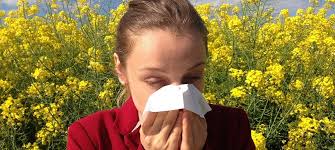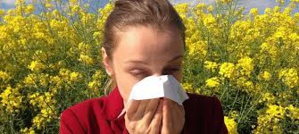Businesses across Japan are hit every year during springtime because of widespread bouts of hay fever even though this is also the seasons when there is blooming of the famous cherry flowers throughout the country as well.
The Dai-Ichi Life Research Institute, a research firm in situated in Tokyo claimed that the allergies that are induced by pollen will cause loss of around 200 billion yen ($1.8 billion) in 2018 to business and otherwise.
Toshihiro Nagahama, the institute's chief economist clarifies that there are several ways that the ailments cause damage. Consumption is hit because very few people would want to go out because of the ailments and more days off from work is taken by workers because of suffering from hay fever. And even if they are able to go to work, their productivity is low because of the illness.
And for the sufferers of hay-fever in Japan, 2018 is apparently expected to turn out to one of the worst years in the history of Japan with respect to this disease. Compared to last year, some parts of the country have recorded double the amount of pollen count.
One of the regions hit particularly hard is Tokyo. While in 2008, less than one third of the population of the city suffered from hay fever, this year half the capital city's population was hit by it according to estimates by a local government survey.
The efforts at reforestation in the country after War II is the core of the problem in Japan.
Following the World War II, the reforestation efforts concentrated more on planting of various types of cedar and cypress trees and those trees now have attained maturity and in or near their capacity for peek pollen production. This is the worst news for hay fever sufferers.
Allergy indicating trees are being felled every year in Tokyo and are being replaced by tree varieties that have lower pollen production and for this about $7 million is being spent by the city every year.
Since 2006, trees in about 60 hectares are being re4placed annually by the city authorities. But there are chances of landslides and flooding from the hills around Tokyo if the cutting and uprooting of the trees is too fast.
"It's not enough," said Mamoru Ishigaki, who is in charge of Tokyo's forests. He added that the around 30,000 hectares of pollen-producing trees exists in the city.
"I'd like to increase the amount we replant, but even then it'll take between one and two hundred years to complete," Ishigaki said. that will add on to the current costs.
However. There has been brisk business for pharmaceutical companies and drug stores because of the growing demand for surgical masks and medicines because of hay fever.,
And according to Japanese medical research firm Anterio, the highest level in 10 years and an increase of 50% compared to the same month a year earlier was noted in the sale of anti-hay fever drugs which surpassed the 20 billion yen ($184 million) mark in March this year.
(Source:Money.cnn.com)
The Dai-Ichi Life Research Institute, a research firm in situated in Tokyo claimed that the allergies that are induced by pollen will cause loss of around 200 billion yen ($1.8 billion) in 2018 to business and otherwise.
Toshihiro Nagahama, the institute's chief economist clarifies that there are several ways that the ailments cause damage. Consumption is hit because very few people would want to go out because of the ailments and more days off from work is taken by workers because of suffering from hay fever. And even if they are able to go to work, their productivity is low because of the illness.
And for the sufferers of hay-fever in Japan, 2018 is apparently expected to turn out to one of the worst years in the history of Japan with respect to this disease. Compared to last year, some parts of the country have recorded double the amount of pollen count.
One of the regions hit particularly hard is Tokyo. While in 2008, less than one third of the population of the city suffered from hay fever, this year half the capital city's population was hit by it according to estimates by a local government survey.
The efforts at reforestation in the country after War II is the core of the problem in Japan.
Following the World War II, the reforestation efforts concentrated more on planting of various types of cedar and cypress trees and those trees now have attained maturity and in or near their capacity for peek pollen production. This is the worst news for hay fever sufferers.
Allergy indicating trees are being felled every year in Tokyo and are being replaced by tree varieties that have lower pollen production and for this about $7 million is being spent by the city every year.
Since 2006, trees in about 60 hectares are being re4placed annually by the city authorities. But there are chances of landslides and flooding from the hills around Tokyo if the cutting and uprooting of the trees is too fast.
"It's not enough," said Mamoru Ishigaki, who is in charge of Tokyo's forests. He added that the around 30,000 hectares of pollen-producing trees exists in the city.
"I'd like to increase the amount we replant, but even then it'll take between one and two hundred years to complete," Ishigaki said. that will add on to the current costs.
However. There has been brisk business for pharmaceutical companies and drug stores because of the growing demand for surgical masks and medicines because of hay fever.,
And according to Japanese medical research firm Anterio, the highest level in 10 years and an increase of 50% compared to the same month a year earlier was noted in the sale of anti-hay fever drugs which surpassed the 20 billion yen ($184 million) mark in March this year.
(Source:Money.cnn.com)






